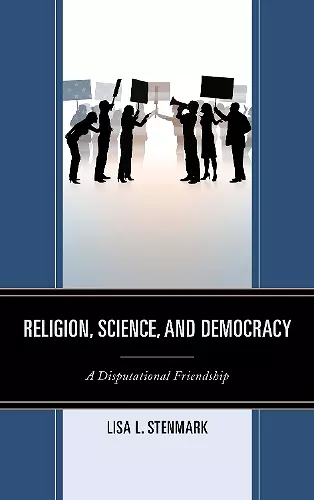Religion, Science, and Democracy
A Disputational Friendship
Format:Hardback
Publisher:Lexington Books
Published:8th Mar '13
Currently unavailable, and unfortunately no date known when it will be back

Despite the increasing popularity of “religion and science” as an academic discourse, the intersection of science and religion remains a front line in an ongoing “culture war.” The reasons for this lie in an approach to discourse that closely resembles the model of discourse promoted by John Rawls, in which plural discourse —such as between religion and science— is based on a foundation of shared beliefs and established facts. This leads to a “doctrines and discoveries” approach to the relationship of religion and science, which focuses on their respective truth claims in an attempt to find areas of agreement. This framework inherently privileges scientific perspectives, which actually increases conflict between religion and science, and undermines public discourse by inserting absolutes into it. To the extent that the science and religion discourse adopts this approach, it inadvertently increases the conflict between religion and science and limits our ability to address matters of public concern. This book suggests an alternative model for discourse, a disputational friendship, based on the work of Hannah Arendt. This approach recognizes the role that authorities —and thus religion and science— play in public life, but undermines any attempt to privilege a particular authority, because it promotes the position of the storyteller, who never settles on a single story but always seeks to incorporate many particular stories into her account. A disputational friendship promotes storytelling not by seeking agreement, but by exploring areas of disagreement in order to create the space for more conversations and to generate more stories and additional interpretations. Successful discourse between religion and science is not measured by its ability to determine “truth” or “fact,” but by its ability to continually expand the discourse and promote public life and public judgment.
Stenmark makes a strong and attractive case for a morally adequate approach to religion and science that recognizes differences while granting greater equality. * Zygon: Journal of Religion and Science *
In this innovative essay, Lisa Stenmark tugs us out of the ‘doctrines and discoveries’ approach to religion and science and back to genuine social engagement. Focusing on storytelling, meaning-making, and ‘world-building,’ she envisions a prophetic rather than political (or purely private) role for the science-religion dialogue. Well-argued and persuasive, Stenmark‘s book offers an inspiring vision of a ‘disputational friendship’— learning ‘to stay, and to listen, and to be with each other.’ -- Philip Clayton, Ingraham Professor of Theology, Claremont School of Theology, Author of In Quest of Freedom: The Emergence of Spirit in the Natural World
The predominant public and academic discourse about religion and science in recent decades has focused on questions of truth. Lisa Stenmark here argues that this emphasis on ‘doctrines and discoveries’ is misguided, and represents a fundamental misunderstanding of both science and religion. Drawing on the thought of Hannah Arendt and engaging such prominent thinkers as John Rawls, Richard Rorty, Stanley Hauerwas, and Jeffrey Stout, Stenmark’s aim is nothing less than to shift debates about religion and science to what she sees as a more profitable direction, one that recognizes the political dimensions of discourse about concepts of neutrality, authority, and tradition that informs our understanding of both religion and science. Provocative and thought-provoking, Stenmark’s proposed model of 'disputational friendship' deserves attention as a new model of thinking about this most important of issues. -- Gregory R. Peterson, South Dakota State University
ISBN: 9780739142868
Dimensions: 234mm x 160mm x 25mm
Weight: 485g
238 pages